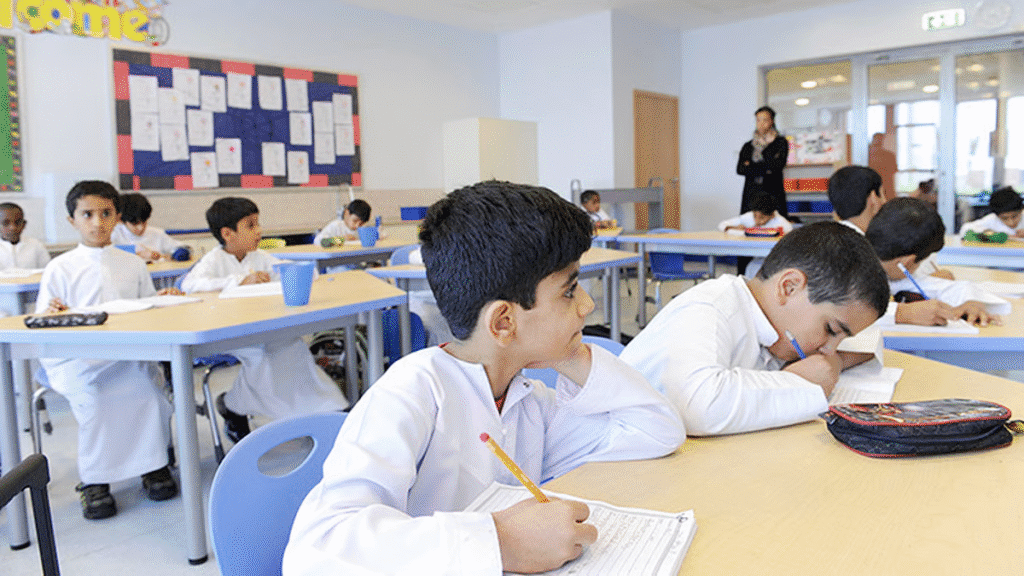Abu Dhabi school discipline has entered a new era, focusing on guidance, growth, and respect. The Abu Dhabi Department of Education and Knowledge (ADEK) has updated its Student Behavior Policy, banning ten traditional punishments and introducing a supportive framework that encourages personal development and accountability in students.
Emphasizing Positive Behavior
The new framework is designed to prevent misconduct before it occurs by clearly defining behavioral expectations and promoting consistency in disciplinary measures. Instead of relying on fear or punishment, schools are encouraged to understand the root causes behind students’ actions and to guide them toward better choices.
Central to this approach is the introduction of a comprehensive anti-bullying policy. ADEK expects schools to handle behavioral issues through dialogue, intervention, and accountability, ensuring that students learn from their mistakes while maintaining emotional well-being.

Four Levels of Misconduct
ADEK’s revised policy categorizes offenses into four distinct levels, making it easier for schools to determine appropriate responses.
Level 1 – Minor Offenses
Minor infractions include tardiness, uniform non-compliance, incomplete homework, or misuse of digital devices. These incidents are addressed with gentle guidance and reminders.

Level 2 – Moderate Offenses
Moderate violations encompass skipping school activities, verbal disputes, or minor property damage. Schools are encouraged to engage students in reflective discussions and involve parents when necessary.
Level 3 – Major Offenses
Major misconduct includes bullying, academic dishonesty, forgery, vandalism, or physical assault. These actions require more structured intervention and may involve temporary removal from classrooms or supervised community service.
Level 4 – Severe Offenses
Severe violations cover serious issues such as possession of weapons, cybercrimes, substance abuse, or acts of arson. In these cases, strict disciplinary measures, including suspension or expulsion under official approval, may be applied.
11 Permitted Disciplinary Measures
The policy allows schools to implement 11 specific disciplinary actions depending on the severity of the offense. These include verbal and written warnings, formal meetings with parents, temporary classroom removal, supervised community service, or suspension. Permanent expulsion is only possible under strict official guidelines.
ADEK emphasizes that disciplinary actions should always be age-appropriate, proportionate, and aimed at correcting behavior rather than simply punishing students. This ensures that every measure taken promotes personal growth and learning.
10 Prohibited Punishments
To safeguard student well-being, ADEK has banned ten forms of punishment that are considered harmful or degrading. These include physical and psychological punishment, public humiliation, withholding food or water, confinement, grade deduction as a penalty, or sharing personal information without consent.
By prohibiting these practices, schools are encouraged to focus on constructive and supportive approaches, fostering a culture of trust and respect between students and educators.

Building a Culture of Respect
The new policy aims to create a school environment that aligns with UAE’s cultural and social values. Teachers are expected to model respectful and responsible behavior, reward positive conduct, and guide students toward making better choices.
Students are encouraged to actively participate in extracurricular activities, respect their peers and teachers, and represent their schools positively within the wider community. ADEK stresses that guidance, prevention, and personal development should always take precedence over punitive measures.
Implementation and Teacher Training
ADEK mandates that all schools adopt the updated Student Behavior Policy and ensure staff receive proper training. Teachers must be equipped to handle misconduct with empathy, analyze its root causes, and involve parents when necessary.
This holistic approach ensures consistency across schools and helps maintain a safe, fair, and supportive environment for all students.
Encouraging Growth and Accountability
The focus on constructive discipline allows students to take responsibility for their actions while learning valuable life lessons. By emphasizing guidance, emotional support, and academic assistance, the policy ensures that students grow not just academically but also socially and emotionally.
Schools now have a structured framework to balance correction with encouragement, helping students build confidence, resilience, and a sense of accountability.
A Progressive Step for Abu Dhabi Education
ADEK’s reform represents a significant shift in how discipline is approached in Abu Dhabi schools. By banning harmful punishments and introducing a supportive framework, the policy encourages a culture of respect, understanding, and positive reinforcement.
Students, teachers, and parents all benefit from a transparent and consistent system where discipline is fair, constructive, and aligned with broader educational goals. This approach positions Abu Dhabi as a leader in progressive education policy and child development.
Do follow UAE Stories on Instagram
Read Next – Dubai Police Warn About Fake Job Ads on Social Media















